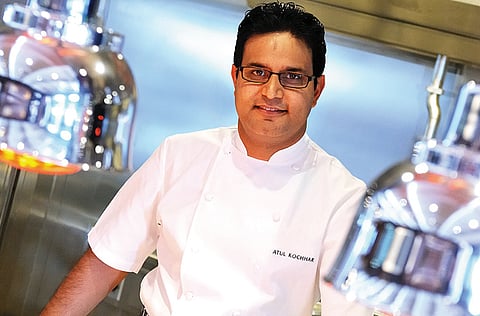A taste of modern India at Zafran
Atul Kochhar was in Dubai recently to open Zafran restaurant at Dubai Marina Mall

Atul Kochhar, the first Indian chef in the world to be awarded a Michelin star, offers Friday a taste of what to expect at his new Dubai Marina Mall restaurant, Zafran, and what he considers good food.
How would you define good food?
Good food is anything that's cooked in a simple manner, tastes of fresh ingredients and maintains its original character.
Tell us about your upbringing and background.
I spent my early years in Jamshedpur, eastern India, where my father ran a catering business. My grandfather was a baker so food has always been an integral part of my life.
I trained at the Oberoi School of Hotel Management as a chef and began my career with the group.
In 1994 I moved to London to open Tamarind - an Indian restaurant that served contemporary cuisine, and in 2001 we were awarded a Michelin star. I opened Benaras (located in Mayfair, London) in 2004, which also went on to be a Michelin-starred restaurant.
How does Zafran's menu stand out from those of the many Indian restaurants in the UAE?
Zafran offers simple, no-nonsense Indian food presented in a stylised fashion. It's contemporary Indian cuisine with authentic influences but I won't call it traditional. I designed a menu that captures the flavours of India and tried to incorporate the best from different regions.
How would you describe your style of cooking?
My style is modern Indian. Although I was trained classically my food is contemporary and innovative. What excites me about food is the fact that I can explore and experiment with it. The idea of amalgamating different flavours influences my dishes.
What does the Michelin star mean to you?
The Michelin star is a stamp of quality and consistency. It gives international acceptability because it is a standard that people regard highly. The popularity of Indian food is growing steadily as more and more people are getting interested in it and getting to know it better.
What trends do you foresee in Indian cuisine on the international platform?
For any cuisine to grow and be accepted on an international platform its creators have to open up, adapt, adopt and evolve.
You have to change to grow and evolve and I think we are on the right track, although there's much more that needs to be done. There are five Michelin-starred Indian restaurants in London and three in New York, which shows how far Indian food has come.
How far would you go with experimenting with food?
Research and development never stops in my kitchen as I constantly experiment. Sometimes I succeed and there are times when the combinations don't work.
Armed with an understanding of flavours, I go all out to create something new. I have a few culinary rules. I don't like to do surf and turf together. There was a time when I wouldn't mix fruit and meat but not any more. One has to possess a thorough understanding of flavours since not everything works well together. For instance, panch phoren (an Indian spice mix) doesn't go with celery, which has a mild flavour. However, it might work well with mushrooms, which are more robust and earthy.
Many people who are not familiar with Indian cuisine believe that it's all about spicy curries. Do you think Indian chefs are doing enough to dispel that notion?
Indian cuisine is so diverse and that's probably its shortcoming too, because it is difficult to define Indian food. For a non-Indian, the cuisine is at times confusing because there is no one particular definition of Indian food. It varies from region to region.
The reason why Indian food is often misunderstood is because of the various clichés attached to it. People need to know that our food is not just about the curries, deep-fried food or mushy ingredients steeped in oil. There's more to it. It is a very rich and vibrant cuisine.
Is there a difference between authentic Indian food and Indian fare that caters to an international palate?
Food evolves with time, just like everything else, it's a natural progression. Change is inevitable and when it's for the better it enriches. The demands change and requirements alter.
The food that I do is Indian in its ethos but I never shy away from exploring new territories. In order to introduce our cuisine to the outside world we have to present it in a manner which is well understood and appreciated.
Flexibility is the key and the way to take it forward would be to incorporate and integrate local ingredients as well as styles of cooking in traditional preparations.
Which other cuisine do you regard as closest to Indian food?
Thai is very close to Indian, probably due to its geographic proximity. The way complex flavours are treated in both cuisines is quite similar.

